
Now, yet more people are dying in Ukraine.
A solution that should have been found in 2015 must now be found and implemented as soon as possible to bring this death to an end. It is imperative. It has been imperative for eight years.
So where can such solutions be found?
We can engage in emotional reactiveness. We can demonise, finger-point and signal our own virtue. We can tearfully admire and call for bravery, courage and sacrifice. We can highlight the deaths of children, the shelling of civilian residential areas, the bombing of innocents, and throw superlatives into the fire of outrage. We can sanction, isolate, punish, and accuse (crimes against humanity, war crimes, murder, genocide).
This has been the response of ‘the west’ since the Russian military operation began.
All of which provide no solution nor even de-escalation.
To expect even a temporary ceasefire without concession is unreasonable and unhelpful. Yet what might those concessions be? What would the price of peace and the cessation of hostilities be… even if but for a week? What would a lasting long-term solution be founded upon?
This is where emotion must be put aside and ignorance banished; ignorance of history and reality. Facts and truth must be faced, and as with many facts and much truth, it can become uncomfortable, nuanced and less two-dimensional.
Yet an answer must be found.
To foster a pragmatic solution and to illuminate the ‘situation’ in Ukraine… here are some facts and truths. Many are uncomfortable… because they reside in the grey zone rather than the black and white world most appear to prefer.

Ukraine is not an homogonous entity. It is not a united country. No single president, or governmental structure, or province or citizen is able to illustrate or articulate the will and desire of all Ukrainians.
There is no overwhelming majority view.
Across the geographical territory known as Ukraine there are people with differing histories, cultures, religions, traditions… even (and importantly) differing primary tongues and external allegiances and aspirations. There are regions that predominantly speak Ukrainian and others that predominantly speak Russian.
There is no unity and thus no common direction nor goal.
Satisfy one group, province, political party… and others will be spurred to outrage and violent protest.
This means the country has been in a state of violent protest, counter-protest, and civil war without end since the chains of the USSR were removed and ‘autonomy’ and ‘independence’ achieved.
This deep-seated division within Ukraine has been fostered and taken advantage of by internal political movements, ideologues and ideologies, as well as external ‘players’ for their own power or pecuniary ends.
External players would predominantly include the European Union, NATO, Russia and the United States (alongside a number of NGOs and ‘oligarchs’). In concert, the machinations of such external players have sown division, hatred, violence, rebellion and governmental coup within Ukraine; all would argue the opposite, that they seek peace and democracy and harmony for Ukraine.
The scale of ‘support’ from just the US is eye-watering…
The 2016 [Obama] Consolidated Appropriations Act includes a section entitled “Ukraine Security Assistance Initiative,” which appropriates $250 million “to provide assistance, including training; equipment; lethal weapons of a defensive nature; logistics support, supplies and services; sustainment; and intelligence support to the military and national security forces of Ukraine.. .”
Additionally, the US is to spend at least $658.2 million on “bilateral economic assistance,” international security assistance,” “multilateral assistance,” and “export and investment assistance” for Ukraine in 2016.
All this follows nearly $760 million in “security, programmatic, and technical assistance” and $2 billion in loan guarantees that the US has provided Ukraine since the February 2014 Maidan coup.
I could write books on the links between the US and Ukraine alone… but I’ll leave that can of worms to you, dear reader (Hunter Biden and Burisma, anyone? Hilary and the FBI vs Trump, anyone? Anyone?). Suffice to say…
During and following Maidan, the US interfered in the political process, promoting ultranationalist figures as a bloc-based government favourable to the west and severely anti-Russian. The US funded ultranationalist and openly-Nazi political groups, organised and trained the Ukrainian National Police, funded and re-trained the Ukrainian Armed forces alongside ultranationalist militia and regular units; activities undertaken by Victoria Nuland (she of the ‘fuck the EU’ comment), with the active support of a variety of US government agencies and NGOs, politicians (including Joe Biden and John McCain).
Here’s Victoria Nuland, current US Under Secretary of State for Political Affairs (under Biden), when she was Assistant Secretary of State for European and Eurasian Affairs (under Obama) photo-opping with [right to left]…
Arseniy Yatseniuk – Prime Minister (2014-16) after the Maidan Revolution, ex-leader of the ‘Fatherland’ party,
Vitaly Klitschko – Founder of Ukrainian Democratic Alliance for Reform, Mayor of Kiev, leading figure in the Maidan Revolution, and
Oleh Tyahnybok – Founder of C-14. Remember C-14; they come up later.
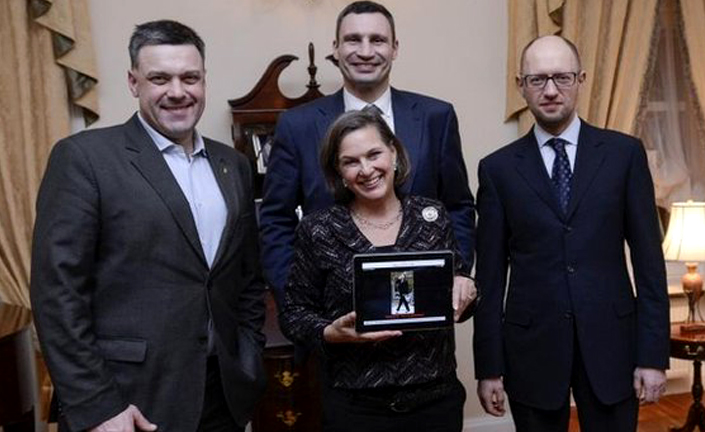
And here’s a happy Oleh with friendly Joe…
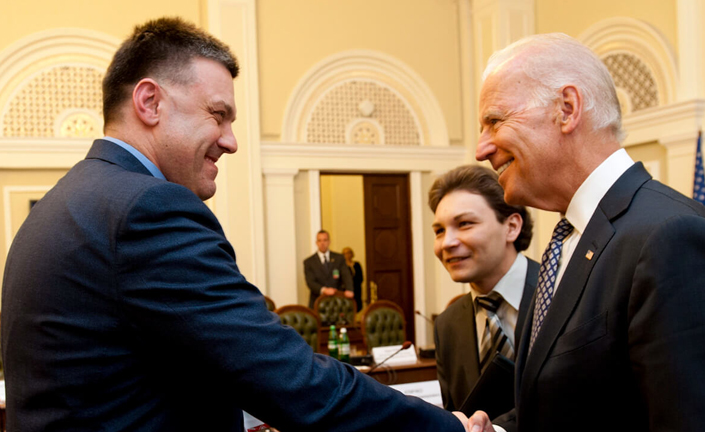
Unfortunately, with regards to foreign influence, Ukraine must choose between the lesser of evils.
Evidently.
There is no perfect ally. There is no perfect solution.

Within the population of Ukraine there are resentments directed eastward and westward; mistrust of the EU, NATO, Russia and the US along with the inevitable calls for closer ties to the EU, NATO, Russia and the US.
There is no consensus.
Internally, division and resentment come from many historic sources, some more ancient and some more recent.
There are political parties, prominent and influential individuals, organisations and militia units that can be accurately categorised as ‘fascist’ (even ‘neo-nazi’). There are groups (though less vocal) that can be categorised as ‘communist’ or (more accurately) ‘Russophone.’ Others that may be viewed as liberal or populist, of varying flavours.
Some illumination of division within Ukraine is indicated by popular support for (or opposition towards) the controversial ideologue, Nazi-collaborator, anti-communist, anti-Semite and violent ultranationalist, Stepan Bandera.
Support for Bandera amongst active political organisations and oligarchs is strongest in the central and western regions and virtually non-existent in the east and south.
Bandera and his supporters organised a pogrom that slaughtered 4,000 Jews in Lvov in 1941. A Banderist pamphlet of the time proclaimed to Ukrainian Jews (of whom some 1.5 million were eventually killed) “We will lay your heads at Hitler’s feet.”
There are numerous statues of Bandera in Ukraine…
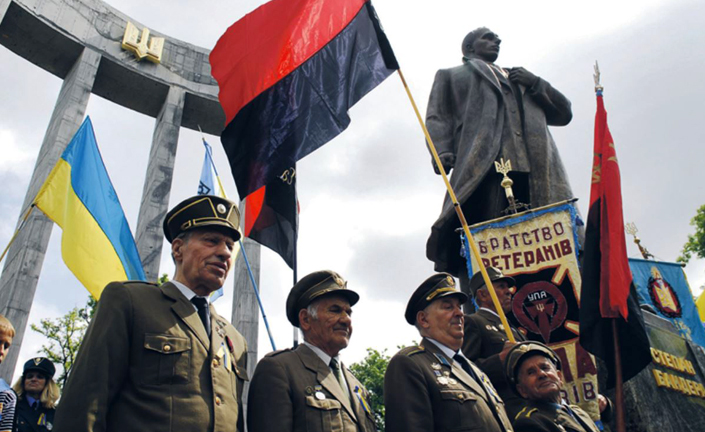
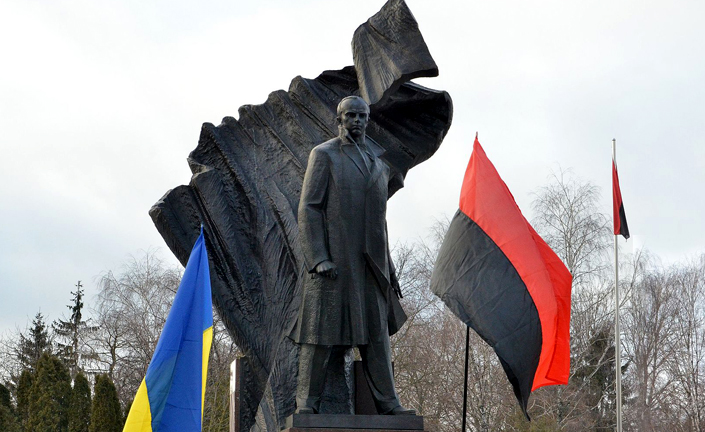
This particular bronze statue…
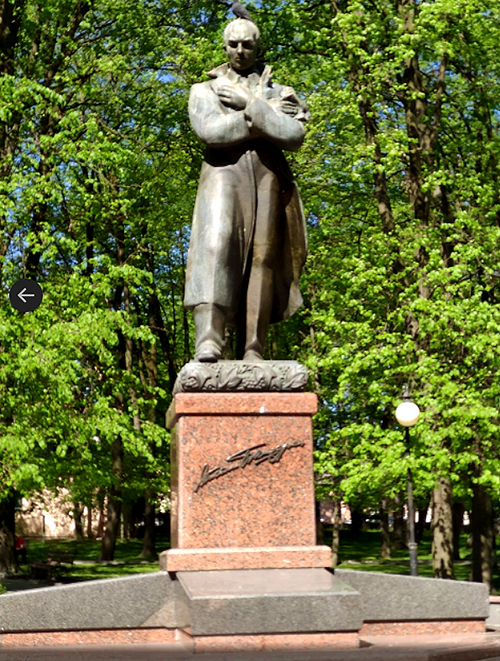
… stands in a park in the Galician town of Drohobych (close to the western border with Slovakia and Poland, and where most of the town’s 15,000 Jews were murdered during WWII).
The statue stands on the site of the town’s former Jewish ghetto.
Viktor Yushchenko (Ukrainian president 2005-2010) awarded the title of ‘Hero of Ukraine’ to Bandera (posthumously) in 2010, an award which was condemned by the European Parliament and annulled in 2011 by Yanukovych.
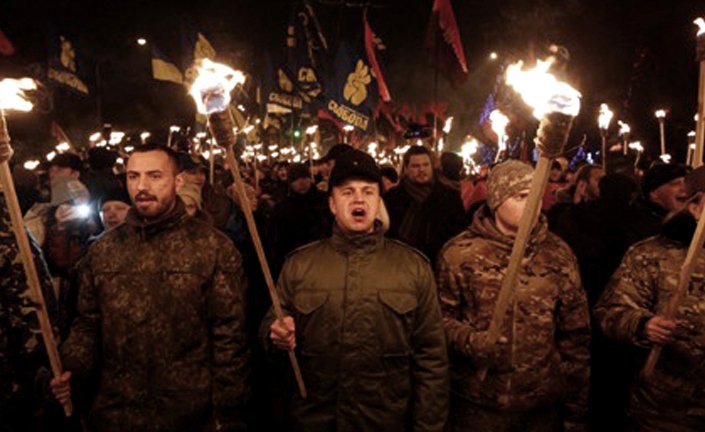

There have been over 70 political parties in Ukraine since 1990 which can perhaps be categorised over time as
- ‘conventional‘ (predominantly Social Democrat, Socialist, Communist etc often forming a ‘situational majority’ style government comprising multiple groups and smaller parties),
- ‘oligarchial‘ (powerful and influential politicians and business moguls with ‘clans’ formed representing supportive regions) and
- ‘bloc‘ (merged groups usually as a mixture of parties/oligarchs/factions each with associated media outlets).
It should be noted that the 2019 Presidential Election procedure (for example) involved an initial tranche of multiple candidates (79) that progressed through two ’rounds’ of voting where failed candidates switched and ‘gifted’ the support of their voting bloc as the procedure progressed.
Unlike the (obviously non-presidential) system in the UK (for example) where the public are required to cast a single vote in national elections (generally from a relatively small field of political parties and independents), in Ukraine a two-round ‘vote-off’ is held with the public required to cast a vote in each of the two rounds.
In the first round (with 79 candidates/parties) Zelenskyy earned 30% and Poroshenko 16% of the total votes cast. In the second round (with 2 candidates) Zelenskyy won a ‘landslide’ 75% of the votes.
From a UK perspective I would argue that the first round of voting is far more indicative of support amongst the population. 30% voted for Zelenskyy in that vote, meaning 70% of Ukrainians didn’t.
Given the polarisation of opinion within the population, coupled with the marshalling of vote-bloc-transfer by failed candidates and the utilisation of politically-aligned news media channels and publications, there are more factors at play in the eventual election of Zelenskyy (and any other candidate under this system) than mere public vote.
Speaking personally, this is an ‘impure’ democratic process, as it allows for a great deal of ‘influence’ and ‘manipulation’ beyond the simple vote of the population, especially when that influence and manipulation is tied to opaque financing and wholly-partisan media coverage.

Ultranationalist neo-Nazi and full-blown Nazi organisations exist and thrive in Ukraine; these include political parties Natsionalnyi korpus (National Corps), Pravyi sektor (Right Sector), Svoboda, and quasi-militia group C-14.
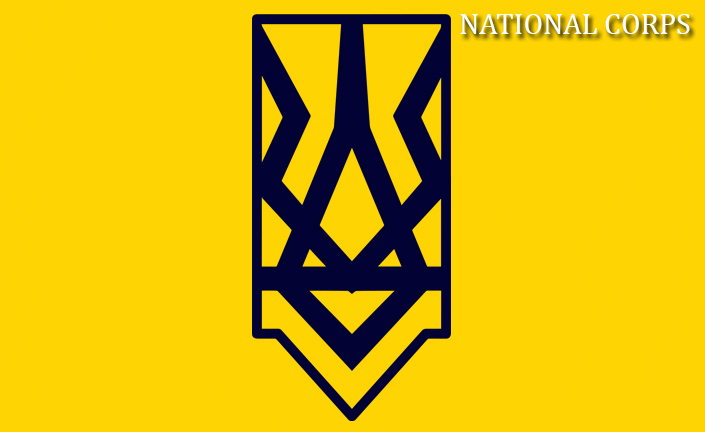
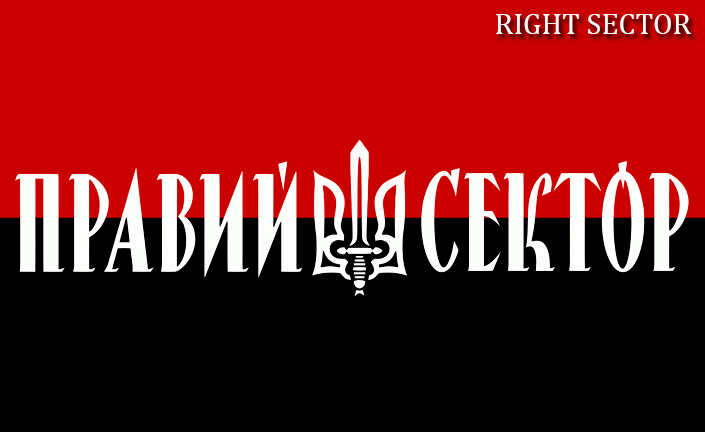
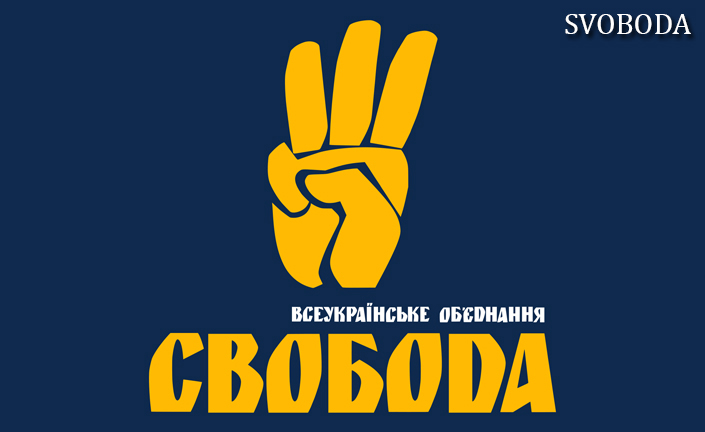
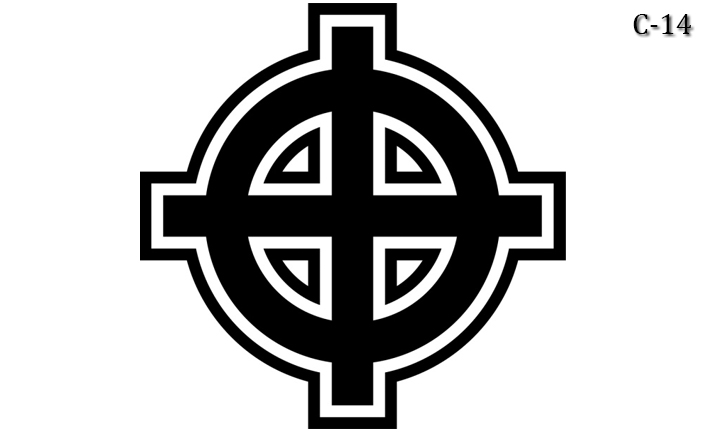
In the 2019 election all major right-wing parties formed a ‘united party’ with these neo-Nazi and Nazi organisations in opposition to the candidacy of Poroshenko and in furtherance of common nationalist aims, though they failed to win sufficient support during the first round of voting and ultimately failed in passing the threshold necessary to win parliamentary seats.

The Right Sector and National Corps (particularly) are closely-affiliated with a regular unit of the Ukrainian National Guard (designated as a ‘Special Operations Detachment’) known as the Azov Battalion (despite being upgraded to regiment-size).
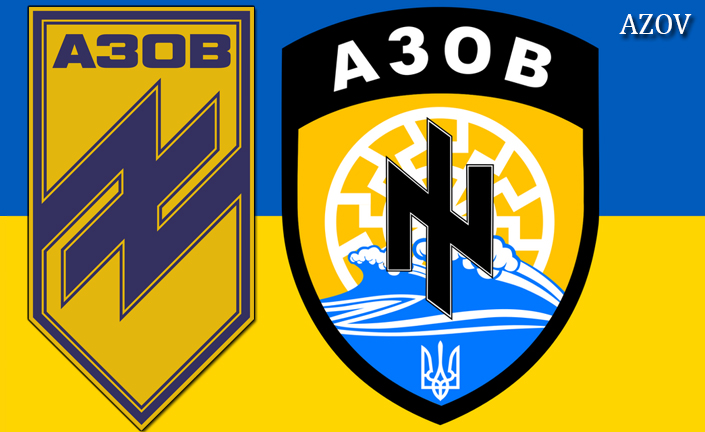
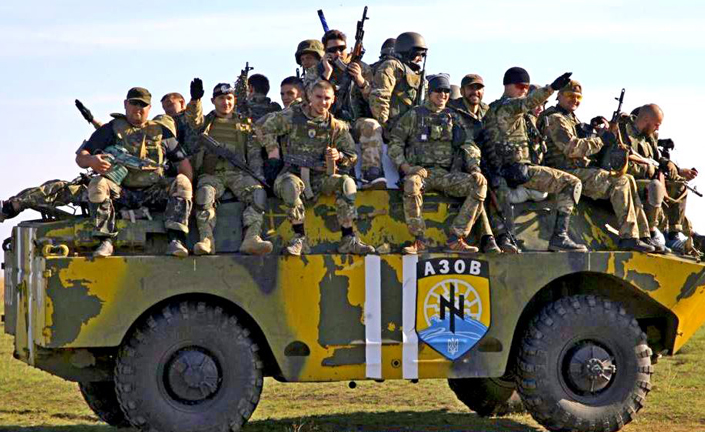
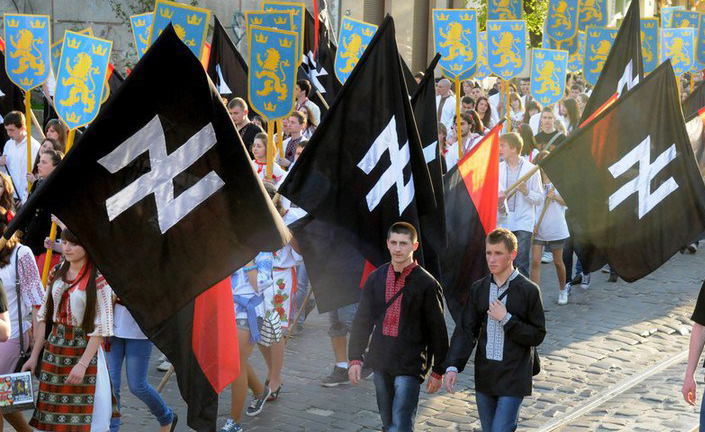
Azov insignia derives from the ‘WolfsAngel’, used by the 2nd ‘Das Reich’ SS Panzer Division. Although Azov denies any Nazi connotation, soldiers often are covered in swastika tattoos and other Nazi symbolism; any denial is pure tripe.
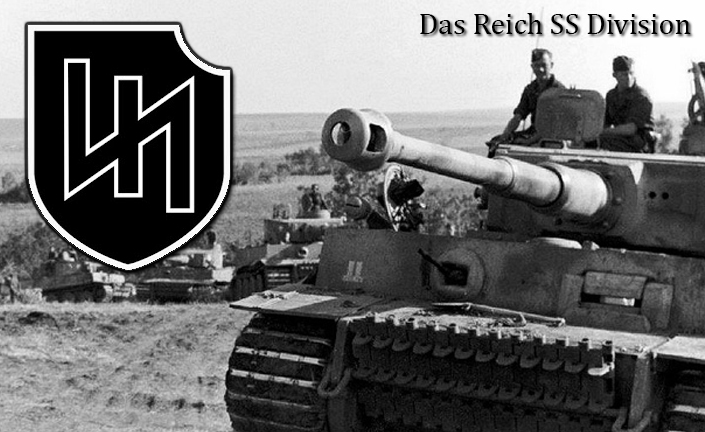
Members and past-members of Azov have served in various military and government positions; for example Azov’s deputy commander, Vadym Trojan was appointed head of Kiev Oblast (province) police. Andriy Biletsky served as the Commander of Azov prior to taking up the government office of ‘People’s Deputy of Ukraine’ (2014-2019) and is currently the leader of the National Corps.
‘The historic mission of our nation in this critical moment is to lead the White Races of the world in a final crusade for their survival, a crusade against the Semite-led Untermenschen. ‘
Andriy Biletsky.
Azov is an official organisation within the military structure of Ukraine.
It is not a fringe ‘militia.’
It comprises commando battalions, field artillery batteries, tank battalions (T-723B) and numerous supportive reconnaissance, logistics, sigint, engineer (etc) companies. It has three regimental depot/barracks in Kiev, Berdiansk and Mariupol.
Foreign far-right recruits from Scandinavia, Sweden, Ireland, Croatia, Poland, Serbia and Italy serve with Azov. As it is illegal for them to serve the regiment as foreigners, they have taken Ukrainian citizenship to remain in Azov.
Azov received training in and by the US and Canada and received direct funding from the US (prior to being banned from such training by US and Canadian governments for being ‘neo-Nazi’ – you couldn’t make this up!). It has been promoted by the Atlantic Council, a think-tank and promotional arm of NATO.
The Atlantic Council has confirmed that US arms companies are quietly equipping Azov, particularly with the AirTronic PSRL-1 RPG launcher (Azov posted the following photo on it’s website, showing the weapon in training use – since removed)…
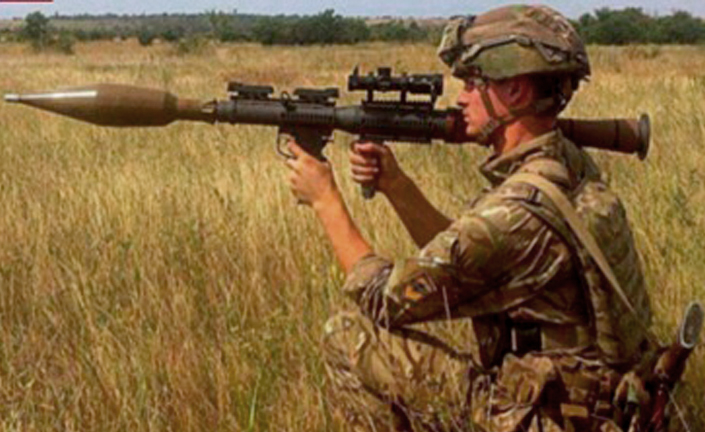
… but also with regards to sigint equipment, surveillance drones, infra-red/nightvision sighting equipment, rifles, heavy mortars, artillery and a variety of other ‘lethal defensive weapons’ (!).
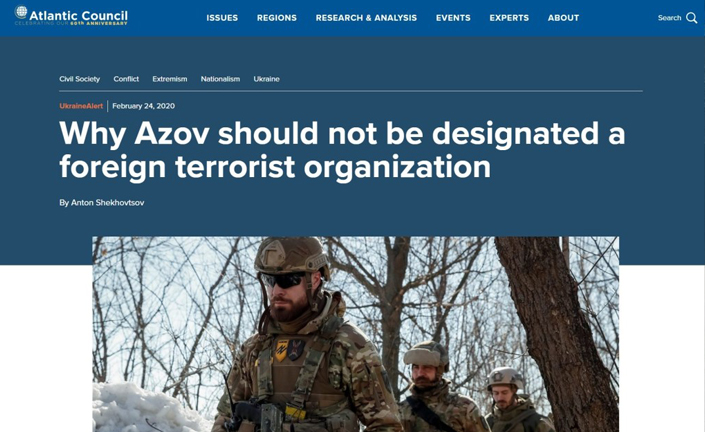
Though an Atlantic Council article from 2020 admitted that it is ‘indisputable’ that the ideology of Azov is rooted in Nazism and that it operates as a ‘far-right’ unit, they argued that it should not be designated as a terrorist organisation because it forms ‘an integral part of official structures’ under ‘orders given by the interior ministry’ and that it would be a ‘gift to the Kremlin’ to designate Azov as a terrorist organisation.
This despite the fact that were the unit active in the UK, EU or US it most certainly would be a terrorist organisation.
Azov would be illegal in Germany (not least for its swastika fetishism and Nazi symbolism), which makes Germany’s recent shift in support of Ukraine (alongside a huge GDP increase in military spending and intention to engage the German military in world affairs) confusing and not a little concerning.
In 2019 the New York Times described Azov as ‘a Ukrainian neo-Nazi paramilitary organisation.’ However, in recent March 2022 articles they describe Azov as ‘a unit of the Ukrainian National Guard.’ Make of that what you will.

Formed by Oleh Tyahnybok (remember him shaking the Biden hand?) the neo-Nazi group known as C-14 (which has close ties with Right Sector and was formed as the youth wing of another Tyahnybok ultranationalist party, Svoboda) is associated with acts of violence against ethnic minorities, trade-unionists, journalists, women’s rights and LGBT activists and derives it’s name from the 14-word slogan ‘We must secure the existence of our people and a future for White Children.’
An associated C-14 militia unit known as the Municipal Guards was used by the authorities in Kiev to provide ‘security services’ in 2018. C-14 were responsible for attacks against the Roma in the Lysa Hora reserve in Kiyv in 2018, supported by MPs and government ministers. C-14 have a particular distaste for Roma communities and have repeatedly attacked them in Lviv and Kiev, often with the collusion of the police.
Ukraine’s Ministry of Youth and Sports gave funding to C-14 in order to promote ‘national patriotic education projects.’
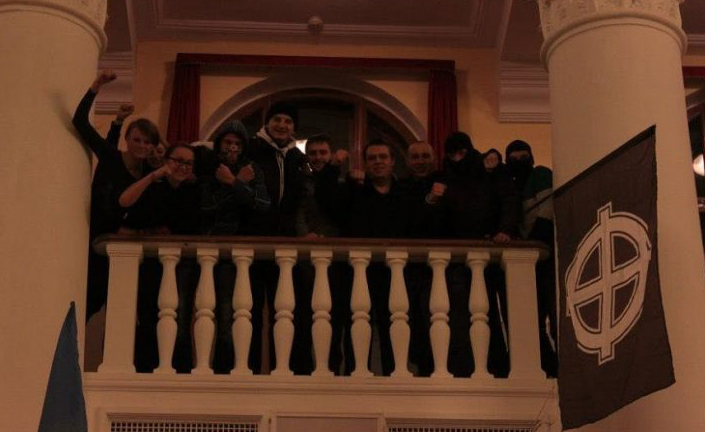
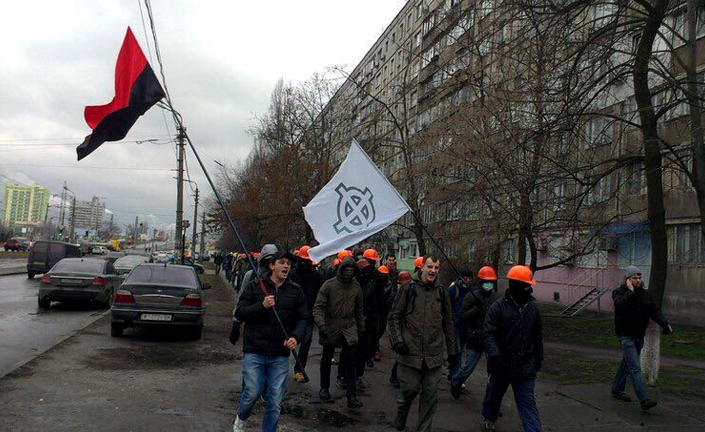
Here’s Yevhen Karas, leader of C-14 explaining that they [Nazis] have been given weapons by the west because they perform the tasks the west has set out and that they enjoy killing. He also speaks about Nazi influence during the Maidan Coup [para: we were the brains and muscle and the liberal activists were the sheep] as well as the existence and influence of ultra-nationalist forces within Ukraine…
I really could go on and on here… but in regards to the pervasiveness and popularity within Ukraine of ‘far-right’ ideology, ideologues, politicians, government officials and military organisations… in truth, Nazism… that should suffice. If you need more evidence, just look for it… just because our western media doesn’t report on it doesn’t mean it’s difficult to find.
Interestingly, Putin stated the ‘demilitarisation and denazification’ of Ukraine as primary aims in his ‘Donbas Operation’ and was summarily panned and dismissed as a fantasist and propagandist for so doing. Nazis, Vlad? Oh come now, that’s just a false flag pretext thing! Those aren’t the droids you’re looking for.
Moving swiftly on…

Given the lack of cohesion and periodic dominance of transient power-players (exacerbated by external influencers), violent conflict has been an ever-present feature of life in Ukraine.
The ‘Granite Revolution’ (1990), The ‘Orange Revolution’ (2004), The ‘Maidan Revolution’ (2014, AKA the ‘Revolution of Dignity’)… each saw different groups seeking political and societal influence by increasingly violent, thuggish and murderous means.
Swings in dominance have seen right-wing groups gain prominence and control since 2004, and particularly since 2014, and also in the election cycle in 2019.
These shifts have seen the eastern and southern regions of Ukraine increasingly marginalised (in terms of economic strategy, and – importantly – in terms of education and language, with the Crimean Tartars and Donbas Russian-speaking populations restrictively targeted by Kiev), which led to protests against the central/western dominance of Kiev… in Odessa and the Crimea (in the south) and in Luhansk and Donetsk (cumulatively referred to as the Donbas region, in the east).
This has led to conflict in the Donbas, a de-facto civil war, which has violently raged since 2014 leading to the destruction of Donbas villages and infrastructure as well as the deaths of 14,000 citizens.
Events in Kiev in 2014 also prompted the Crimean population to vote for annexation with Russia, which was accomplished in March 2014. Protests in the Odessa region against the government in Kiev were also violently suppressed and resistance there is ongoing.
With the exit of the Crimea from Ukraine and particularly following the horrific murders of anti-maidan protestors in Odesa, the Donbas (eastern) and cities (oblast) of Odessa, Mykolaiv, and Mariupol (southern) formed the core of eastward-leaning will and desire within the citizenry, with calls for closer ties (even – in the case of Donbas – for ‘reunification’) with Russia.
The central and western cities and regions evidence a westward-leaning will and desire, with calls for closer ties to the European Union and NATO membership.
On an associated note, corruption within the political and economic structures of Ukraine is rife, pervasive and sufficiently serious such that both the EU and NATO entry negotiations have frequently stumbled on this issue. This corruption is at turns decried and encouraged by external players depending on benefit and influence.
So the lines are now drawn within Ukraine with no prospect of peaceful internal resolution and with violent division and suppression. The Ukrainian Army and Kiev-backed militia formations are at war with Ukrainian separatist and protest movements in the east and south of Ukraine. This is not merely a local policing action; artillery and air strikes have been used in Donbas since 2014.
Despite electoral promises, the current Ukrainian president (Zelenskyy) did not move decisively to cease hostilities in the Donbas.
Most westerners have remained unaware of the true situation in Ukraine since the fall of the USSR, much less any history predating that event.
Most westerners are unaware of the direct and enthusiastic involvement of many Ukrainians in the fascist horrors of WWII Nazi slaughter in Poland, Ukraine, Belorussia and Russia itself, or of the Stalinist genocide against the ‘kulaks’ (including many in Ukraine); estimates of the dead number from two to six million.
Most westerners simply haven’t a clue about Ukraine. Yet they sure can signal their virtue.
I digress.
Given the intransigent internal situation within Ukraine, to some degree therefore, the future direction of Ukraine would depend upon the intent and involvement of external players.

Which is where mention of Russia’s red-line insistence upon denial of NATO membership for Ukraine should be addressed.
Much is made, in the west, of the free determination of Ukrainians to decide upon and choose their own external alliances, direction and future. If they want to join NATO, so be it and rightly so, the argument goes; they are a free and democratic independent sovereign nation and entitled to do so irrespective of Russian demands… beholden to no-one.
Yet there is clearly no consensus for NATO membership, within Ukrainian citizenry. The desires of the population are relatively equally split with regard to westward or eastward facing policies, economic alliances and external memberships.
Which leaves the issue of ‘free determination’ entirely to Kiev and whichever political party, group or individual has power at any one time. Elections and referenda may give some direction but at present – truthfully and unfortunately – Ukraine is simply not a functioning democracy and there is no appetite for referenda.
The first act of Zelenskyy upon winning the 2019 election (on a populist, centre-aligned platform) was not (as promised during his election campaign) the cessation of hostilities between Ukrainians in the Donbas region (which has actually intensified in the period to present)… but the disbanding of the Parliament of Ukraine (ostensibly to target ‘corruption’ but having the effect of removing all rivals and replacing them with supporters), since when he has jailed his political rivals (Viktor Medvedchuk being the most prominent). Since 2019, editors and journalists of media outlets critical of his presidency have been threatened and silenced.
To describe the current state of politics in Ukraine as ‘democratic’ is to stretch the definition somewhat excessively. There is a state of civil war in the Donbas region, for a start.
We in the west, of course, wish Ukraine to face westward… to join the EU and/or NATO family. We think that is the best thing for Ukraine. In doing so, we ignorantly ignore the current state of the democratic system in Ukraine and the wishes of all citizens to the contrary.
In arguing for the ‘free choice of the free people’ of Ukraine to join NATO and the EU if that be their will, the west also belligerently and deliberately ignores the legitimate security concerns of Russia.
Given that Putin has stated (from 2014 on) that his ‘solution’ to the problems within Ukraine would be a partnership between the EU, the IMF and Russia in rebuilding and expanding the economy of Ukraine… coupled with the freedom of the Ukrainian population to face east or west in terms of politics and economy and with no need even to ‘be friendly’ towards the Russian Federation, one wonders why this proposal was rejected. Does it not appear reasonable? Russia supported both Minsk accords, which would have guaranteed the territorial integrity of Ukraine; the Ukrainians (predominantly) broke these accords continually with no effort on behalf of the EU or US to insist that Ukraine comply.
As recently as January 2022, the EU “explained that Russia’s claim to halt the Euro-Atlantic integration process for Ukraine and Georgia is unacceptable to the EU since it limits sovereign countries’ right to choose which international organizations they wish to join.”
Yet though Russia would clearly prefer Ukraine not become a member of the EU (they have said so on many occasions), such a situation would not be a ‘red line’ for Putin. The EU knows this. So the only ‘international organisation’ they are referring to must be NATO.
It would thus appear that the EU is simply insistent upon an argument for the free determination of citizenry of all sovereign nations. To join NATO.
Putting NATO membership to one side momentarily, this raises two questions; the first being that of the thorough lack of internal consensus within Ukraine, and the second how the EU would greet the ‘free determination’ of the citizenry were Ukraine to seek integration with Russia and the Russian Federation.
This eastward-facing ‘free determination’ actually was the eventual position of the elected government under Poroshenko from 2014 to 2019. Needless to say Poroshenko was condemned as a ‘Putin Puppet’ by both the US and EU and a cloud of accusations and allegations against Poroshenko (complicated by the active involvement of the US) led to his forced escape to Russia following the 2019 election. This sequence of events could be legitimately argued ‘a coup.’
To be clear, two democratically-elected Ukrainian governments that decided to shift towards Russia rather than towards the west have been ousted… one in 2014 following a violent mob-US putsch and another in 2019 following a coup. How the hell can we in the virtuous west countenance this?
To remain content in thinking those two governments were ‘corrupt and under the threats and influence of Russia’ is a blatant form of ignorant, deluded, hypocritical double-standards that flies in the face of truth. It’s amazing the rationalisations and cartwheels the ‘western narrative’ is reliant upon.
The EU, evidently, would only support the ‘free determination of sovereign citizens’ in the event of their choosing the EU. Or NATO. Choose Russia, and you are a puppet of Putin. Choose the EU and you are a free and sovereign nation and puppet to no-one. The US also parrots this hypocritical and self-serving line of reasoning.
By any measure, these are duplicitous double-standards on behalf of both the EU and US. Which is also why the Minsk I and II agreements were nothing more than a time-buying exercise on behalf of Ukraine, France and Germany in order to finance, train and build up the Ukrainian armed forces. In other words, a lie… with the OSCE aiding and abetting the ‘monitoring’ of the ceasefire aspect of the agreements.
Which leaves the thorny problem of NATO membership and the related security concerns of Russia.
Does Russia have any right to determine Ukraine’s membership of NATO?
We could analyse the move eastward of NATO since the fall of the USSR, and NATO expansion into thirteen countries, inching ever closer to the borders of Russia. We could analyse the argued paranoia of Russia towards the west. We could argue that Putin has territorial expansion intentions in the creation of a new Russian Empire. We could even insist that the west, and in particular NATO and the US are entirely benign and well-intentioned.
Yet one thing is undeniably true…
The ‘free determination’ of Cuban citizens were irrelevant to the security concerns of the US during the Cuban Missile Crisis. Missiles belonging to an hostile power 90 miles from Florida were considered to be a ‘clear and hostile’ threat to the security concerns of the USA and the US was willing to go to war with the USSR over the issue, along with the resultant danger of a nuclear exchange. It was a red-line for the USA. No compromise. It was clear, as the US position at the time argued, that missiles stationed so close to the continental USA would give little warning of a nuclear strike and thus no opportunity for defence.
In short, given the pre-eminent security concerns of the US, the free determination of the sovereign state of Cuba was irrelevant. No missiles. No debate.
The post-war world is full of ‘sovereign nations’ packed with citizens with ‘free determination’ that the US has given no thought to in the pursuit of it’s self-determinations of ‘overriding security concerns.’ Cuba is but one pertinent example. The US has ‘security concerns’ that ‘threaten the defence of the continental USA and her allies’ all over the globe, from the Marshall Islands, the South China Sea, the Middle East, the Philippines, South America, Africa… and the US has never been deflected from action (military or economic) by the ‘sovereignty’ of any nation nor the ‘free determination’ of citizens.
This might be a good point at which to mention that the US has military personnel in 130 nations and 900 overseas bases. Oh and also, between 1945 and up to 2015, 81% of all global military conflicts have been initiated by the USA; during that period, the earth had 248 armed conflicts of which the USA started 201, with a total death toll of 30 million. And counting.
That’s a mountain of ‘sovereign nations’ and millions of citizens that had ‘free determination’ until the US turned up.
And yet… the singular security concerns of Russia in relation to the NATO membership of Ukraine are simply not to be respected… even though such NATO membership would involve the positioning of hostile (from the Russian perspective) military personnel and missiles right on the border with Russia.
It is clear that the security concerns of nuclear-armed nations require respect. Failure to show such respect is dangerous for world peace, let alone the prosperity of any non-nuclear power caught up in those concerns.
NATO membership of Ukraine is a legitimate red line for Russia and has been stated so for decades. It’s obvious why. To insist upon it being an issue of the ‘free determination of the sovereign democracy of Ukraine’ is duplicitous and a palpable source of escalation.
And yet NATO itself declares…
NATO stands with the people of Ukraine and its legitimate, democratically elected president, parliament and government. The Alliance will always maintain its full support for the territorial integrity and sovereignty of Ukraine within its internationally recognised borders.
Dialogue and cooperation started when newly independent Ukraine joined the North Atlantic Cooperation Council (1991) and the Partnership for Peace programme (1994).
Relations were strengthened with the signing of the 1997 Charter on a Distinctive Partnership, which established the NATO-Ukraine Commission (NUC) to take cooperation forward.
Since 2009, the NUC has overseen Ukraine’s Euro-Atlantic integration process, including reforms under the Annual National Programme (ANP).
Cooperation has deepened over time and is mutually beneficial, with Ukraine actively contributing to NATO-led operations and missions.
Priority is given to support for comprehensive reform in the security and defence sector, which is vital for Ukraine’s democratic development and for strengthening its ability to defend itself.
Since the NATO Summit in Warsaw in July 2016, NATO’s practical support for Ukraine is set out in the Comprehensive Assistance Package (CAP) for Ukraine.
In June 2017, the Ukrainian Parliament adopted legislation reinstating membership in NATO as a strategic foreign and security policy objective. In 2019, a corresponding amendment to Ukraine’s Constitution entered into force.
In September 2020, President Volodymyr Zelenskyy approved Ukraine’s new National Security Strategy, which provides for the development of the distinctive partnership with NATO with the aim of membership in NATO.
Given the internal and external situation, the failure of the two Minsk Accords, and NATO maneuverings, the Russian ‘invasion’ of Ukraine was inevitable. One might even argue that the west caused it.

It is my opinion that internal division within Ukraine leading to the violent dominance of the central and western regions of Ukraine over the southern and eastern regions coupled with the interference in the ‘democratic’ revolutions and politics within Ukraine from the US (particularly) and the machinations both of the EU and most specifically of NATO is more of a cause of the current horrific state and conflict than any involvement or intent from Putin or Russia.
Which is not to say that the military actions of Russia and Putin are to be condoned in any way… the horror, fear, suffering and death inflicted by such a move is evident and undeniable… simply that to find the solution I mentioned at the start, we have to be objective and face some uncomfortable truths.
So.
In order to attain a complete withdrawal of all Russian military forces and the swiftest end to suffering and death the west first needs to come to terms with Russia and the realities of balance-of-power politics with regard to Ukraine.
Russia must be respected with regards to Ukraine’s non-membership of NATO.
In 1991 it was made clear to the Russians that NATO would not move east of the River Elbe – a promise that has been broken numerous times since. In 2008, NATO leaders promised Ukraine it would one day be given the opportunity to join the alliance – a promise that must now be broken.
Guarantees must now be made.
Following on from this, Russia must also guarantee the territorial border integrity of Ukraine and it’s right to self-determination.
All external governments must guarantee the integrity and self-determination of Ukraine in so far as their own involvement in or interference with the governance of Ukraine.
A substantive economic package of aid and assistance should be agreed upon with the aim of rebuilding and expanding the economic viability of Ukrainian industry and commercial institutions. Such aid and assistance (however constituted) would require independent, non-aligned administration of significant funds from a variety of sources, including Russia. The distribution of such funds should be contingent upon the manner in which the government of Ukraine conducts itself in respect to the entirety of its citizens, irrespective of ethnicity, culture, language, or any regional consideration.
If we can’t do something akin to this, and soon, then the only solution will be a purely military one and thus one that Russia alone will determine.
Should a military solution be the only remaining factor, there are still a small number of possible outcomes.

This war will ultimately be determined by artillery (a doctrinal element massively in Russia’s favour) and small/large-scale local encirclements creating cauldrons resulting in continuous and debilitating casualties for Ukraine as the weeks and months pass.
Russia will periodically strike logistic and transport hubs behind the contact line. However, I do not foresee the targeting of energy production facilities (power stations) or a widescale destruction of non-strategic road bridges, or purely civilian infrastructure and economic/commercial facilities. I believe that the Russian civilian population and leadership will neither seek nor support avoidable casualties amongst the Ukrainian population as an imperative.
Through use of air/sea/land-launched missile strikes, Russia will reduce Ukraine’s power-distribution facilities thus impacting the logistical rail network (mostly run through electric locomotives), oil and gas storage and processing facilities, and petrol/diesel stores, particularly if the need arises for Ukraine to redeploy troops across oblasts. The most-damaging time for such energy-facility infrastructure attacks could be as the rains come in late-autumn/early winter/spring (for obvious, somewhat muddy, reasons).
As the aim of the war, from a Russian perspective, is the ‘demilitarisation’ of Ukraine, I am certain that we will see the destruction of the in-theatre Ukrainian forces over time, and at a hugely favourable (war-winning) ratio for the Russians. This will be, I believe, the overarching attritional ‘tactic’ of the Russian leadership and all military operations. For those that will judge the conflict on a territorial basis, this will (I’m sure) cloud their forthcoming analyses and understanding but I am convinced that ‘geography’ will be a lesser tactical and strategic concern.
Ukrainian equipment will be destroyed, replacements will be destroyed, repair-facilities will be destroyed, resupply capacity will be destroyed… manpower will be exhausted… until the airforce ceases to be operationally capable and the army increasingly reliant on civilian SUV’s or reduced to static trench-warfare.
Ukraine will see it’s own current soviet equipment/systems comprehensively destroyed, followed by anything supplied (piecemeal and with lessening impact over time) by the west… until Russia thoroughly dominates and can dictate whatever terms they wish.
With reference to matériel that may be supplied to Ukraine from western sources, this may perhaps initially involve such equipment and systems with which the Ukrainians are themselves familiar, are trained and skilled with, and that can be repaired and maintained.
There are few countries that could gift such equipment and no obvious means of self-replenishment.
Current Ukrainian fixed and rotary aircraft, artillery, tanks, armoured-personnel and assault vehicles, air-defence systems etc… and any armament/ammunition/spare-parts required… are predominantly ex-soviet (though some with recent modification/upgrade). Such matériel is not standard for most NATO/western countries. Given that Ukraine will be industrially-incapable of manufacturing any replacements… once the initial Ukrainian hardware is attrited, and the trickle of relevant western-supplied ex-soviet hardware runs dry… there are few viable alternatives.
The Ukrainian military are unfamiliar with the vast bulk of NATO hardware. Training takes time and though I’m sure western nations will offer such assistance, it will not be able to keep pace with battlefield losses, either in terms of manpower or equipment.
Should such NATO matériel be provided, this would provoke (perhaps insurmountable) training, supply, repair and maintenance issues. There are also limitations in the stockpiles of western nations who, I am sure, will be unwilling to provide matériel to Ukraine to the detriment of their own defence requirements. Such limitations will become highly relevant when it comes to armaments and ammunition, particularly for artillery and air/ground missile systems. We shall see.
As I mentioned, given that a stated aim of the war is demilitarisation… territory, in terms of geographical real-estate (and ‘big name’ cities) will be less important. This means that the Russians will choose positions that give an easy defensive capability (well-protected by overwhelming, interlinked, and accurate artillery to the rear) perhaps based upon river/rail/hardpoint features… rather than insist upon acquiring and holding mere cartographic area (as will perhaps dominate the Ukrainian/Western mind).
Given such… large and small-scale Russian withdrawals, redeployments, readjustments and redistributions may occur and should, actually, be expected.
To some degree, this overall approach will be influenced by the Ukrainian appetite for offensive operations; if and when they attempt large-scale offensive/counter-offensive attacks, I believe the Russians will be content to sit back and attrite such forces. Russia will follow the Soviet-era ‘playbook’ echelon defence system with the singular aim of killing Ukrainian soldiers. Only when the Ukrainian forces are sufficiently degraded will the Russians themselves undertake large-scale offensive operations.
Therefore it is possible that as time passes and Ukrainian strength bleeds away, the Russians may shift from attrition to territorial/positional goal-achievement through offensive operations.
The success of those future operations may be determined by the ability of the Ukrainians to withhold, protect and maintain their own artillery and ammunition (during the attrition phase), and thus their own capacity to cause significant casualties to the advancing Russians as they shift to the offensive as the conflict develops.
I doubt this will be the case. It may prove to be too little, too late and the Russians will – almost certainly – attempt to engage in effective counter-battery operations during the attrition phase as a priority.
Besides, Ukrainian military doctrine and force-training is based upon that of NATO. Therefore, I very much doubt that they will take time and the preservation of force into much consideration.
NATO is dominated by US doctrine and experience acquired and practiced over decades, characterised by shock and awe and massive, overpowering domination… against opponents with little or no air capacity (offensive or defensive), little or no artillery and no significant counter-battery capability, few technologically equivalent (or superior) systems, and troops with poor training and morale; from nations with no military industrial capacity for manufacture, ability to repair, retool or replace equipment/ammunition, or significant economic resources or strength to wage war. To my understanding, the US/NATO has not faced military (or economic) equivalency in an opponent since Korea.
The US military (and ‘the west’ generally) is enamoured of technological ‘wonder-weaponry’ and has a blinding belief in it’s own excellence and superiority, alongside an overweening faith in it’s own destructive firepower and military dominance (particularly in systems). It also mocks, denigrates and evidences contempt for the ability, capability, professionalism and capacity of the Russian military, an approach that I am sure has been instilled throughout the Ukrainian military; a fatal mistake.
However with regards to this conflict, not only would all of this be an inappropriate miscalculation, but Russia has a long – and highly relevant – history and tradition of comprehensively and decisively defeating such opponents. It should also be pointed out that Russia has experience in fighting over this territory before (documented, detailed and researched, I’m sure).
That said, the most difficult theatre for the Russians will be to the west of Donetsk, where the Ukrainians have – over eight years – built a long and deep network of defences which include linked conurbations, trenches and bunkered fortifications. However, much like the Maginot line, this defence line does not extend across the entire front and will eventually become encircled and/or punched-through… though at some cost to the Russians. Ukrainian forces in these fortifications will, of course, be pinned and suffer attrition through artillery strikes. Trench warfare and the reliance upon fortified hardpoints has, historically, only served to delay the inevitable; such a reliance has never won a war (though it has contributed to winning battles).
Russia has the will and the time to dictate all aspects of this conflict and Ukraine will eventually have no ability to meaningfully counter-attack or impact the ultimate outcome.
Ukraine simply cannot and will not prevail. Russia will achieve all of it’s territorial objectives (assuming no Ukrainian political collapse) by July/August 2022 at the earliest (a timescale dictated by western ‘military aid’ tranches alongside western diplomatic interference)… more likely during the winter of 2023)… which will include at minimum the Oblasts of Lugansk/Donetsk (including Mariupol), Kherson (specifically the left-bank of the Dniepr), Zaporizhzhia (to the Dniepr), and perhaps even Odesa and Mykolaiv.
Should Ukraine refuse a diplomatic solution, Russia may eventually advance to capture the entire area of south/east Ukraine up to the Dniepr. Should Ukraine (and her backers) insist upon fighting to the bitter end, perhaps even west of the Dniepr and towards (beyond) Kiev, then this war may drag on until the end of 2024.
The most far-reaching outcome of the war would be the removal of the current government (regime change) and the forceful incorporation of Ukraine in toto into the Russian Federation. In my opinion, this is neither desirable nor tenable. It would be disastrous for all concerned and especially for Ukraine; the country would descend into a perpetual partisan conflict with all of the long-term associated misery and suffering. Ukraine would become the ground for covert/overt US/EU vs Russia conflict. Insanity.
The partition of Ukraine would be another possible outcome. This would perhaps entail the central and western regions of Ukraine remaining a neutral nation, independent of Russia but with the eastern and southern regions incorporated into the Russian Federation or with the creation of three or four autonomous yet Russian-aligned independent regions.
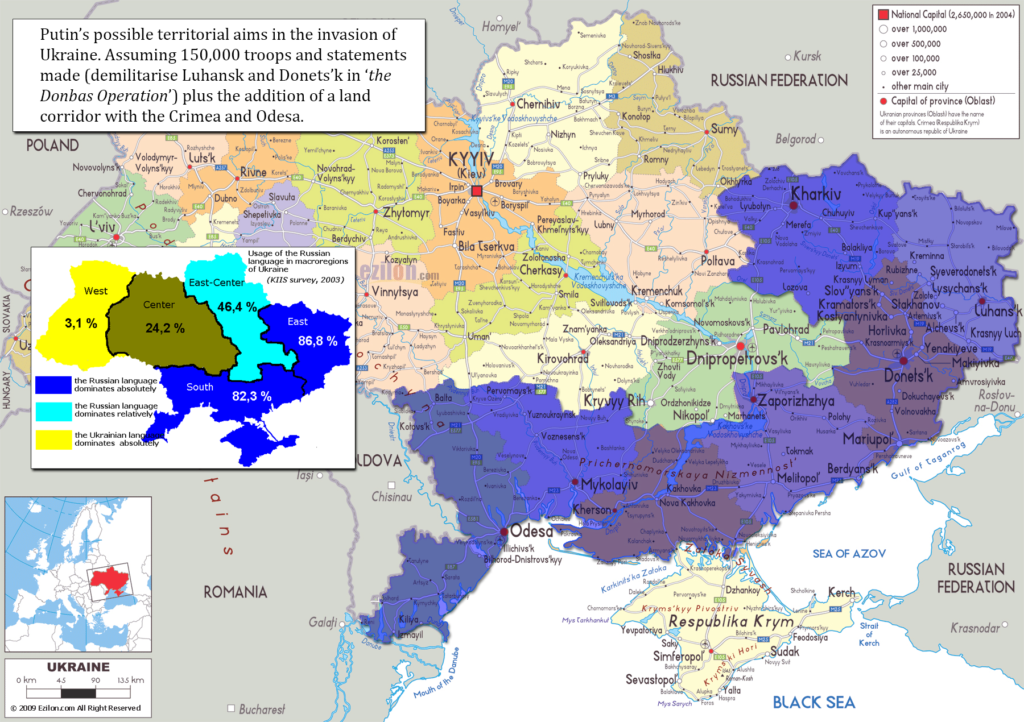
Putin has already recognised the regions of Luhansk and Donetsk as ‘independent regions’ in a statement issued at the commencement of the ‘Donbas Operation.’ This may signal his eventual intent though would arguably not have necessitated military incursions southward from Belarus (a feint) or northward from Crimea. Both of these ‘independent regions’ have units that are fighting alongside Russian forces in the current conflict.
This kind of partition would be eerily reminiscent of that undertaken by Germany with regards to the Czechoslovakian ‘Sudetenland’ in its focus on the ethnic makeup of regions, though it is becoming increasingly clear that Putin has no fear of significant interference by western powers or a lack of belief that Russia can conquer the entire of Ukraine, however he intends to end the conflict.
For what it’s worth, I think that the minimum concessions required by Russia would be…
- Cessation of military activity
- Guarantee that Ukraine would not join NATO and remain neutral
- Recognition of Crimea, Luhansk and Donetsk as independent regions or part of the Russian Federation
Ukraine and the west should accept such requirements. Otherwise, Russia may also claim the ‘secondary’ regions around Kharkiv and Odesa (see map for fullest predicted invasion end goals) and force a complete victory through force of arms.
I believe none of these outcomes are problem-free (long-term) without the ‘acquiescence’ of the US/NATO/EU whose true ‘intent’ is – unfortunately – beating Russia. By which I mean, degrade Russia economically and militarily. The west, it seems, will be content with fighting an endless proxy war against Russia, through the spilling of Ukrainian blood and tears… and with no consideration for the economy and infrastructure and wellbeing of Ukraine (beyond perhaps the pecuniary opportunities).
Through western intransigence and political expediency, a forced military outcome by the Russians may be the only possible outcome. At which point, the west will huff and puff and disapprove and condemn and partake of an endless series of investigations and anti-Russia UN declarations (and such)… and Russia will be ostracised for a time by ‘civilised’ circles. Yet the world does not comprise of the west alone. Russia will find economic and diplomatic respite in Asia, India and the global south. And the earth will continue to turn.
I digress…
It may be that world sanctions will cause economic difficulties for Russia such that it will eventually relent and pull back from Ukrainian affairs completely. Given that such sanctions have not persuaded Iran to ‘see sense’ despite crippling sanctions year on year… and that any sanctions would also negatively impact Europe, the UK, US and other NATO countries (perhaps severely, especially in terms of oil/gas/energy, supremely vital to the economies of many nations), as well as Ukrainians – the very people the world voice support for – I believe such an economic blockade would prove ineffective and ultimately unsustainable. The most likely results of sanctions would be the energy, commercial and economic enfeeblement of the UK and EU and the inevitable forcing of Russia into the arms of a booming China, arguably the one thing that really would be a serious threat to world peace in the more distant future.
What of Russia? Specifically… has Putin signaled intent?

What do we know about Russia’s intentions. Why are they doing what they are doing? What are their motivations and goals? What would it take for them to be satisfied and for the invasion and military operations to stop?
A wise man once told me that to understand the motivations of an individual, you should first listen to what they themselves tell you their motivations are.
Sounds simple, right? Makes perfect sense. Then why have we not heard what Putin said? Why have his words been reduced to short clips? And why have we been so entirely, utterly, and completely dismissive? Why have we mocked and shown naught but derision?
Sure, as with the speeches of most (if not all) politicians, we must wade through the rhetoric and rationalisations; though we would also be wise to return to these later for analysis.
Yet we need to understand what Russia wants in order to end the suffering and death in Ukraine.
So… here’s some of Putin’s speech…
We see that the forces that carried out a coup d’etat in Ukraine in 2014, seized power and are holding it with the help of, in fact, decorative electoral procedures, have finally abandoned the peaceful settlement of the conflict. For eight years, endlessly long eight years, we have done everything possible to resolve the situation by peaceful, political means. All in vain.
As I said in my previous address, one cannot look at what is happening there without compassion. It was simply impossible to endure all this. It was necessary to immediately stop this nightmare – the genocide against the millions of people living there, who rely only on Russia, hope only on us. It was these aspirations, feelings, pain of people that were for us the main motive for making a decision to recognize the people’s republics of Donbass.
What I think is important to emphasize further. The leading NATO countries, in order to achieve their own goals, support extreme nationalists and neo-Nazis in Ukraine in everything, who, in turn, will never forgive the Crimeans and Sevastopol residents for their free choice – reunification with Russia.
They, of course, will climb into the Crimea, and just like in the Donbass, with a war, in order to kill, as punishers from the gangs of Ukrainian nationalists, Hitler’s accomplices, killed defenseless people during the Great Patriotic War. They openly declare that they lay claim to a number of other Russian territories.
The entire course of events and analysis of incoming information shows that Russia’s clash with these forces is inevitable. It is only a matter of time: they are getting ready, they are waiting for the right time. Now they also claim to possess nuclear weapons.
We will not allow this to be done.
As I said earlier, after the collapse of the USSR, Russia accepted new geopolitical realities. We respect and will continue to treat all the newly formed countries in the post-Soviet space with respect. We respect and will continue to respect their sovereignty, and an example of this is the assistance we provided to Kazakhstan, which faced tragic events, with a challenge to its statehood and integrity. But Russia cannot feel safe, develop, exist with a constant threat emanating from the territory of modern Ukraine.
Let me remind you that in 2000-2005 we gave a military rebuff to terrorists in the Caucasus, defended the integrity of our state, saved Russia. In 2014, they supported the Crimeans and Sevastopol residents. In 2015, the Armed Forces used to put a reliable barrier to the penetration of terrorists from Syria into Russia. We had no other way to protect ourselves.
The same thing is happening now. You and I simply have not been left with any other opportunity to protect Russia, our people, except for the one that we will be forced to use today. Circumstances require us to take decisive and immediate action. The people’s republics of Donbass turned to Russia with a request for help.
And here, importantly, Putin went on to specify two primary goals and one related sub-goal…
In this regard, in accordance with Article 51 of Part 7 of the UN Charter, with the sanction of the Federation Council of Russia and in pursuance of the treaties of friendship and mutual assistance ratified by the Federal Assembly on February 22 this year with the Donetsk People’s Republic and the Luhansk People’s Republic, I decided to conduct a special military operation .
Its goal is to protect people who have been subjected to bullying and genocide by the Kiev regime for eight years. And for this we will strive for the demilitarization and denazification of Ukraine, as well as bringing to justice those who committed numerous, bloody crimes against civilians, including citizens of the Russian Federation.
Demilitarisation. This is not a territorial goal. The aim (as I’ve detailed above) is to destroy the military hardware and capability of Ukraine. In so doing, Russia aims to stop the military attacks that have been going on in Ukraine in the Donbas since 2014. Also (I would add) to remove the threat of military action against Crimea.
Is this achievable? Yes. It’s been done before. Successfully. Swiftly.
What could interfere? Rearming (re-militarisation) – from the EU, US and Western powers; fuelling continued partisan warfare.
Denazification. If Russia believes Ukraine to be riddled with Nazis, then I would assume the procedure of denazification to be akin to the denazification of Germany following WWII. Arrests. Investigations. Criminal charges. Trials. Sentencing. Punishment. The banning of Nazi, Neo-Nazi and extremist, right-wing ultranationalist political parties and the replacement of all government and military officials associated with such ideology.
Is this achievable? Yes. It’s been done before. Successfully. Takes time.
What could interfere? If we in the west deny that ‘denazification’ is necessary then it follows that we would deny the necessity of any moves to achieve it, including all of those that I mentioned.
This could lead the EU, US and Western powers to decry such moves as those of an authoritarian, despotic tyrant. The west could make it incredibly difficult for the Russians to achieve this; giving sanctuary to any of the accused, or declaring the entire procedure a ‘crime against humanity’ for example.
We must refrain from throwing a hissy-fit and wailing virtuously at the moon at the ‘denazification’ process… and never forget that we’ve been here before… and that we did the very same thing and for the very same reasons.
Trying to remain rational and putting to one side the current suffering of Ukrainians and the rights/wrongs of the military actions undertaken by Russia, and sincerely seeking a solution… I would have to admit two things…
Donbas/Crimea. The Ukrainian military actions against the eastern and southern regions of their own country have been disgraceful. It has been a civil war at worst and ‘ethnic cleansing’ at least.
Stopping this war should have been the priority of all Ukrainians and all governments of whatever hue and shade. No NATO or EU country should have tolerated such a situation; so why did they?
If the Russians end the situation, albeit by superior military force, then we all should welcome the cessation of ALL military violence.
The west should not continue to send arms and military succour to Ukraine, restricting themselves to humanitarian, economic and rebuilding efforts.
Sending arms to Ukraine cannot stop the Russians. But it can prolong the conflict, the Russian military operation, the aim of demilitarisation, and the suffering.
Ultranationalism. It is crystal clear to me that Putin has cause to view Nazism as a problem and threat within Ukraine. Any rational observer would conclude the same given that Nazism (in some form) is present throughout political appointments, political parties, the internal bureaucracy, police and military of Ukraine.
This doesn’t mean that all Ukrainians are Nazis – far from it – but that the influence of ultranationalism throughout the arteries of Ukrainian life is pervasive and dangerous, to the peaceful and prosperous life and future of Ukrainians, and to the world at large.
Only in the Ukraine – alone in the western world – are there government-armed and government-sanctioned, openly Nazi ultranationalist military units. Only in the Ukraine – alone in the western world – are there such a plethora of popular ultranationalist political parties and influential oligarchs. Only in the Ukraine – alone in the western world – are the societal divisions so stark as to be the cause of incessant, violent, deadly protests and open warfare against their own citizens.
This stuff HAS to stop and Ukraine, the EU, the US, NATO and all of us in the west have simply missed the boat through corruption, ignorance and downright apathy.
We are now where we are. Russia has invaded. It’s done.
We in the west must deal with the situation at hand with the primary aim of stopping the conflict, the suffering, and the death. We must strive to keep a weather eye on the Russians and to hold them to task… but we should support all moves to create a peaceful, safe, prosperous, democratic Ukraine free from extremist, ultranationalist hate.

Protests…
It may be my age but speaking generally, our western predilection for activism and associated protests as a means to sate our demands and express our outrage is widespread.
And problematic.
With specific regard to Maidan, 50,000 protestors out in the streets are perceived and portrayed as the outraged will of ‘the free and sovereign people’ acting ‘democratically’ to have their government take immediate remedial action on an issue with which they disagree.
In truth, whether you agree with the aims of protestors (when they are even voiced) or not… this is mob rule. All of those citizens that are not part of the protest are not being heard… at all. Such a means of affecting government policy is thoroughly un-democratic. Intolerable in a civilised, truly democratic, liberal nation.
50,000 people – even 100,000 – do not represent the will of 45 million… and that they caused the fall of a government is, to my reasoning, deplorable, thoroughly UNdemocratic and should have been, and be, condemned by everyone in the west.
That the Maidan protests drew in the ‘boots-on-the-ground’ support of the US (with US senators giving speeches directly to the protestors – think about that for a minute) appalls me… as it should any reasonable and rational person… and it beggars questions to be asked of their influence, intent and motivation.
They were not supporting ‘freedom’ or ‘democracy.’ No-one was.
The government of Ukraine at that time was legitimate; voted into power by the entire population of Ukraine in an election verified as valid by all international observers. It was ousted through horrific violence (on behalf of the government forces – police, berkut, titushky – and protestors/agitators) and outrage.
Why? Because the government, after lengthy negotiations over a number of years with EU and Russian Federation negotiators, chose the package and direction they thought best for the interests of Ukraine; all of Ukraine. They chose to face east, not west.
It is argued (with merit) that Russia deployed their influence over those negotiations.
As did the EU. As did the US.
Those Ukrainians that wanted to join the EU… began the Maidan (AKA EuroMaidan) protests… 50,000 at peak. Supported, of course, by European governments and US politicians with their evident and obvious self-interest.
There have been a few documentaries made on Maidan and the Ukrainian affairs. ‘Winter on Fire’ (Netflix, 2015 – uploaded by Netflix to YouTube HERE), and a pair of documentaries involving Oliver Stone ‘Ukraine on Fire’ (2016) and ‘Revealing Ukraine’ (2019), as well as a documentary – Donbass (2016) by French journalist Anne-Laure Bonnel, come to mind (all linked below). Watching these will give some grounding for thought and understanding.
As a direct consequence of the results of the EuroMaidan protest, demonstrations and protests began in the Donbas region of Ukraine (Luhansk and Donetsk), as well as in the southern regions and Crimea… by those that did not want to join the EU.
The response of the Ukraine government was to launch a military ‘counter-offensive’ against ‘pro-Russian’ forces, in 2014. This military offensive has been raging ever since.
No outrage. The west has been silent. No-one cared.
Given all of the current outrage expressed towards Russia in regards to alleged ‘shelling/bombing/attacks upon civilians’ I find it hypocritical and clear double-standards from those that remained silent while civil war existed in Ukraine, along with eight years of suffering and death from ‘shelling/bombing/attacks’ upon civilians… perpetrated by Ukrainians.
Some citizens deserve death and suffering without western outrage or intervention, evidently; specifically those who don’t want to join the EU/NATO. Some governments can engage in eight years of shelling/bombing/attacks against their own citizens without international condemnation, sanctions, or military/humanitarian aid for those suffering and dying, evidently.
The sheer volume and quantity of our rank western hypocrisy and double standards is unconscionable.
For those in doubt, consider the ‘Insurrection’ or ‘Capitol Attack’ of January 6th 2021… and the US/Democrat reaction to it. Now imagine a sprinkling of Russian (or Chinese, or French) politicians giving speeches to the 2,500 protestors, urging them on in the name of ‘freedom’ and ‘democracy.’

A final thought on a related issue.
Should western governments, businesses, and individuals express support for Ukrainians?
Only a Putin stooge would answer ‘no,’ right?
What if I were to say… ‘maybe?’
Personally, I’d be more comfortable with any stringent anti-war expression than with the generic ‘I STAND WITH UKRAINE’ utterance. I’d even be quite content with ‘RUSSIA OUT!’
However…
Слава Україні! Glory to Ukraine! Героям слава! Glory to the heroes!
This was the rallying cry and slogan of the UPA (the Ukraine Rebel Army) that fought against the Soviets – on the side of Nazi Germany – during WWII. The UPA was itself formed from the core of Bandera’s OUN-B (Organisation of Ukrainian Nationalists), who also used the slogan.
Under decree from Poroshenko, this slogan became the official salute of the Ukrainian Armed Forces in 2018, though it had been in unofficial use since 2013.
Boris Johnson used these words. Many people have (Bill Clinton, Jacinda Ahern, Ursula von der Leyen, Mark Rutte… Zelenskyy). So do the leaders and members of all of the ultranationalist fascist and Nazi organisations and parties in Ukraine.
Just who is Boris expressing support for when he uses such words?
Unfortunately, in 2022 these words are generically-uttered making them difficult to use, especially for non-Ukrainian westerners ill-informed of any associations.
If, like me, you might wish (when asked) to condemn Russian aggression, I would have no problem. If, like me, you might wish to express empathy towards the death and suffering of Ukrainians, I would have no problem.
But… I would stop short in assuming I have anything in common with Ukrainians (or anyone for that matter) in terms of ideological philosophy or politics… or ‘freedom’ or ‘democracy.’
I would need to talk to them individually before I could do that comfortably.
Why?
Because I most certainly do not ascribe to Nazi, or neo-Nazi, or far-right beliefs and philosophy… and while it might not be a popular thing to say in our current climate, I might even take outright communism over fascism, any day… if push came to shove and if choose I must. I hope that day never comes.
Which doesn’t make me a Putin stooge, either. Far from it.
Words matter. They have meaning and weight… which is why I’m against using them to signal virtue… and I would strongly urge people to take some care when using them to express support towards an entire population.

One final small note regarding Zelenskyy, the current and lauded wonder-hero, poster-boy for western media in their naive ‘he be Jewish therefore Ukraine no be Nazi’ narrative… soon after winning his landslide election and in an attempt to intervene in Donbas… he demanded, then asked, then pleaded, then begged Azov and ultranationalist leaders to move out of Donbas; they told him (para) to ‘fuck off and then fuck off some more’ at which point a (credible) threat was made to hang him from a tree in Kiev.
In the months since, Zelenskyy lost so much popularity he’s been forced to align himself more and more with the very ultranationalist and Nazis he thought he (as El Presidente) could control.
Even as we enter but the end of the first week of hostilities between Russia and Ukraine, Zelenskyy is not in control of large swathes of his own military forces and has become little more than a west-facing propaganda tool for those ultranationalist groups that a) do not want to stop killing Ruskies and b) see themselves engaged in a wider, white-nationalist struggle against slavic-subhumans.
Even were Zelenskyy able to negotiate a ceasefire with the Russians and a cessation of hostilities, it’s doubtful his own forces would listen to him.
Here are a few parting hypothetical theoreticals for you…
What if… Zelenskyy were assassinated by a Ukrainian ultranationalist? What if the assassination were blamed on Russia? What level of hysterical outrage would howl out from the west?
What would be the ramifications of that little thought-nugget?
Listen to what Karas (leader of C-14) said about ultranationalist fermenting and how they covertly took advantage of liberals during Maidan.
Bear in mind that there is evidence to suggest neo-Nazi groups were behind the shooting of 100 protesters during Maidan (something initially blamed on the police and the government).
Bear in mind that we’ve already heard informational-social-media-y-scuttlebutt that some dastardly Chechen Special Forces Group has orders to assassinate El Presidente.
What if… Ukraine invades or assaults Transnistria in order to divert attention from operations in Donbas, seize some form of initiative or perhaps pre-empt a Russian attack from the west (of Odesa) or amphibiously from the south against Odesa. What if this pulls in the Moldovans and Poles into Transnistria with the potential flashpoint for a NATO-Russian conflict?
What if the accusations of ‘genocide, rape, torture, murder, and/or crimes against humanity’ against Russians rises to fever pitch and motivationally-increases the investment (particularly of heavy equipment) of ‘the west’ into Ukraine?
What if a claim is made against Russia of commiting an atrocity on the scale of Ghouta or Oradour-sur-Glane? What if action is taken by ‘the west’ in response and the attack was subsequently found to have been the result of Ukrainian action?
What if NATO troops are killed/captured on Russian soil (attacking oil supplies or logistics and resupply routes, for example)? What if some form of NATO command are killed/captured in Mariupol, or Kherson, of Kharkiv? What if a foreign political leader or delegate is killed while on a visit to Kiev (by Ukrainians or Russians)?
What if… Poland foregoes NATO Article 5 (and Article 4) and puts Polish national troops into western Ukraine around Lviv or on the front line… potentially expanding legitimate operations by Russia onto Polish soil without involving NATO directly?
Mark my words. Anything is possible.

Please note… for reposting clips, excerpts and documentaries to my YouTube channel… all material still currently available ON YouTube… I have been terminated for ‘hate speech.’ Go figure. This world we live in is… what’s the word?
So the original links I provided became invalid. Great. Fortunately, I was able to reupload the material to a spare BitChute channel you can find HERE.
For insight into this conflict I would recommend the following…
A documentary by French journalist Anne-Laure Bonnel called ‘Donbass’ (2016) – HERE
A short video by BBC Newsnight concerning Right Sector – HERE
A short video by TIME (2019) concerning AZOV – HERE
A documentary by French journalist Paul Moreira called ‘Masks of the Revolution’ (2016) – HERE
A lengthy documentary with interviews by Oliver Stone called ‘Ukraine on Fire’ (2016) – HERE
A follow-up documentary with interviews by Oliver Stone called ‘Revealing Ukraine’ (2019) – HERE
Added 8th March 2022 – A Russian perspective, Nikita Mikhalkov – HERE
